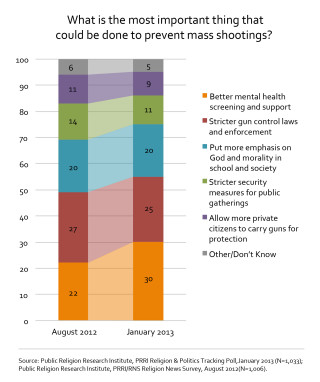I. Increase in Support for Stricter Gun Control Laws
Most major religious groups in the country favor the passage of stricter gun control laws, including majorities of minority Protestants such as black Americans (76%), Catholics (67%), the religiously unaffiliated (60%), and white mainline Protestants (57%). White evangelical Protestants stand out as the group least likely to support stricter gun control laws (38% favor, 59% oppose). Since August 2012, just after mass shootings at a Colorado movie theater, support for stricter gun control laws has jumped 8 points (52% in August 2012 vs. 60% today).
During this period, Democrats’ support for stricter gun control laws increased by 13 points (72% in August 2012 vs. 85% today), while levels of support among Republicans (30%) and independents (54%) remained essentially unchanged.
While there was no significant change in support for stricter gun control laws among most religious groups, support for stricter gun control laws increased 15 points among white mainline Protestants, from 42% in August 2012 to 57% today.
Support for stricter enforcement of existing gun control laws remains strong, but there was no significant increase between August (67%) and today (72%). Although support for stricter enforcement of existing gun control laws generally remained steady among most religious groups, there was a notable 19-point increase in support among white mainline Protestants for stricter enforcement between August (56%) and today (75%).
Few Americans support loosening current gun control laws, a view which has not changed significantly since August among Americans overall (26% in August vs. 23% today). However, there have been some significant shifts by religious affiliation and party. Compared to August 2012, white evangelical Protestants are less likely to support loosening gun control laws (35% in August 2012 vs. 19% today). Republicans are also less likely to favor loosening current gun control laws (36% in August vs. 21% today). Democrats’ and independents’ perspectives on this issue have not changed since August.
II. Increased Support for Mental Health Screenings to Prevent Future Mass Shootings
 When asked about the most important way to prevent future mass shootings from occurring in the U.S., 3-in-10 (30%) cite better mental health screening and support, one-quarter (25%) point to stricter gun control laws and enforcement, and 1-in-5 (20%) say placing more emphasis on God and morality. Only about 1-in-10 Americans cite stricter security at public gatherings (11%) or allowing more private citizens to carry guns (9%) as the most important way to prevent future mass shootings.
When asked about the most important way to prevent future mass shootings from occurring in the U.S., 3-in-10 (30%) cite better mental health screening and support, one-quarter (25%) point to stricter gun control laws and enforcement, and 1-in-5 (20%) say placing more emphasis on God and morality. Only about 1-in-10 Americans cite stricter security at public gatherings (11%) or allowing more private citizens to carry guns (9%) as the most important way to prevent future mass shootings.
There was an 8-point increase in the number of Americans who say that better mental health screening and support is the most important way to prevent mass shootings from occurring in the U.S. (22% in August vs. 30% today). Notably, this increase crosses partisan lines. Both Republicans (17% in August vs. 27% today) and Democrats (24% in August vs. 31% today) are more likely to point to better mental health screening and support as the most important way to prevent mass shootings, while independents’ support (30%) remained essentially steady. Compared to August 2012, significantly more Catholics (23% in August vs. 31% today), religiously unaffiliated Americans (22% in August vs. 38% today), and women (21% in August vs. 33% today) cite mental health screenings as the best way to prevent mass shootings. White evangelical Protestants stand out as only religious group in which a plurality (40%) say putting more of an emphasis on God and morality in school and society is the most important thing that can be done to prevent future mass shootings.
III. Pro-Life Identities And Gun Control
This survey confirms earlier PRRI research demonstrating the complexity of how Americans identify with the terms “pro-life” and “pro-choice.” When asked about these terms separately, about 7-in-10 Americans say that the term “pro-life” describes them somewhat or very well (71%), and about the same number (68%) simultaneously say that the term “pro-choice” describes them somewhat or very well.
These complexities are also reflected among religious groups. For example, 87% of white evangelical Protestants and 75% of Catholics say that the term “pro-life” describes them somewhat or very well. At the same time, 45% of white evangelical Protestants and 61% of Catholics say the term “pro-choice” describes them somewhat or very well.
White evangelical Protestants stand out as one of the few constituencies where holding a strong “pro-life” identity is correlated with attitudes on gun control policy. For example, being “pro-life” is correlated with opposition to stricter gun control laws among white evangelical Protestants, but this correlation does not hold among Catholics. Among white evangelical Protestants who say the term “pro-life” describes them very well, 64% oppose stricter gun control laws, compared to 33% who favor them. By contrast, among Catholics who say the term “pro-life” describes them very well, 61% support stricter gun control laws, compared to 33% who oppose them.
IV. Gun Ownership and NRA Favorability
Nationally, nearly 4-in-10 (38%) Americans live in a household where at least one person owns a gun. White evangelical Protestants (57%) and white mainline Protestants (55%) are the most likely religious groups to report that they live in a household where at least one person owns a gun. This contrasts sharply with other religious groups such as Catholics, only 31% of whom say they live in such a household. There was no change in the National Rifle Association (NRA)’s favorability rating among the general public (56% in August vs. 57% today). However, there was an 8-point drop among those who said they had a very favorable opinion of the NRA (26% in August vs. 18% today). There was also an 8-point increase in the NRA’s favorability among Republicans (77% in August vs. 85% today), while Democrats’ and independents’ views of the group remained steady.
Recommended citation:
Jones, Robert P., Daniel Cox, and Juhem Navarro-Rivera. “Americans Say Better Mental Health Screenings Best Way to Prevent Future Mass Shootings.” PRRI. 2013. http://www.prri.org/research/january-2013-tracking-poll/.


